

Irony Definition
What is irony? Here’s a quick and simple definition:
Irony is a literary device or event in which how things seem to be is in fact very different from how they actually are. If this seems like a loose definition, don't worry—it is. Irony is a broad term that encompasses three different types of irony, each with their own specific definition: verbal irony , dramatic irony , and situational irony . Most of the time when people use the word irony, they're actually referring to one of these specific types of irony.
Some additional key details about irony:
- The term "irony" comes from the ancient Greek comic character called the "eiron," who pretends ignorance in order to deceive an opponent.
- Irony overlaps with, but is not identical to, sarcasm and satire .
- In the last twenty years or so, the term "ironic" has become popular to describe an attitude of detachment or subversive humor, like that of someone who wears a Christmas sweater as a joke. This more recent meaning of ironic is not entirely consistent with the original meaning of irony (a fact which itself might be described as being somewhat ironic).
Irony Pronunciation
Here's how to pronounce irony: eye -run-ee
Irony in Depth
The term "irony" usually refers to three particular types of irony:
- Verbal irony is a figure of speech in which the literal meaning of what someone says is different from—and often opposite to—what they actually mean. For example, if someone has a painful visit to the dentist and when it's over says, "Well, that was pleasant," they are using verbal irony because the intended meaning of their words (that it wasn't at all pleasant) is the opposite of the literal meaning of the words. Verbal irony is the most common form of irony. In fact it is so common that when people mention "irony," they often are actually referring to verbal irony.
- Dramatic irony Is a plot device that highlights the difference between a character's understanding of a given situation, and that of the audience. When the audience watching a movie know what's behind that door, but the character in the movie has no idea... that's dramatic irony.
- Situational irony refers to an unexpected, paradoxical, or perverse turn of events. It is an example of situational irony when, in the O. Henry story " The Gift of the Magi ," a young wife cuts off her hair in order to buy her husband a chain for his prized watch, but the husband sells his watch to buy his wife a comb for her beautiful hair.
Although these three kinds of irony may seem very different at first glance, they all share one important quality: a tension between how things appear and how they really are. For a more in-depth look at each of these devices, please visit their individual pages.
Also, it's worth knowing that sometimes instances of irony don't quite fit into any of these categories, and instead align with the more general definition of irony as something that seems to be one way, but is in fact another way. Put more broadly: sometimes irony is verbal irony, sometimes it's dramatic irony, sometimes it's situational irony, and sometimes it's just irony.
Irony, Sarcasm, and Satire
Besides the three main types of irony described above, two other literary devices—sarcasm and satire—share a lot in common with irony:
- Sarcasm is a bitter, cutting, or mocking taunt used to denigrate a particular person, place, or thing. It can sometimes take the form of verbal irony. For instance, if you were to say to someone who had just cut you in line, "What a polite, civilized person you are!" that would be sarcasm in the form of irony, since your meaning is the opposite of the literal meaning of your words. Sarcasm very often involves irony. However, it doesn't always have to use irony. For instance, when Groucho Marx says "i never forget a face, but in your case I'll be glad to make an exception," he is being sarcastic, but his words, however witty they are, mean exactly what they say.
- Satire is a form of social or political critique. Like sarcasm, it often makes use of irony, but it isn't always ironic.
You can get more details on both sarcasm and satire at their specific pages.
Irony Examples
All three forms of irony are used very frequently in literature, theater, and film. In addition, sometimes the irony found in any of these mediums is broader and doesn't fit into any of the specific categories, and is instead just general irony.
Irony in "The Sell Out"
" The Sell Out " by Simon Rich is a short story recently published in the New Yorker that is full of irony. The story is narrated by a Polish Jew named Herschel, who lives in Brooklyn in the early twentieth century. Herschel accidentally preserves himself in brine for one hundred years, and when he is finally discovered, still alive, in 2017, he is introduced to his great-great-grandson, a young man who lives in present-day Brooklyn. On Herschel's first day, the great-great-grandson Simon tells Herschel about computers. Herschel describes the scene (note that Hershel's English isn't all that great):
It takes him long time, but eventually Simon is able to explain. A computer is a magical box that provides endless pleasure for free. Simon is used to constant access to this box—a never-ending flow of pleasures. When the box stops working—or even just briefly slows down—he becomes so enraged that he curses our God, the one who gave us life and brought us forth from Egypt.
This description is a great example of irony in the most general sense. The humor stems from the disparity between what seems to be true to Herschel (that computers are magic pleasure boxes) and what is actually true (that computers are, well, computers, and that people are kind of stupidly addicted to them). The use of irony is effective here because Hershel's description, as outlandish as it is, actually points to something that is true about the way people use computers. Therefore, the disparity between "what is" and "what appears to be" to Herschel isn't merely a comical error; rather, it's ironic because it actually points to a greater truth about its subject.
Verbal Irony in Don Quixote
One famously ironic work is Miguel de Cervantes's Don Quixote . At one point, the book's narrator states:
… historians should and must be precise, truthful and unprejudiced, without allowing self-interest or fear, hostility or affection, to turn them away from the path of truth, whose mother is history.
We can identify the above quotation as an example of verbal irony if we consider that the book's hero, Don Quixote, is fundamentally incapable of distinguishing truth from fiction, and any historian of his life would have to follow a double track of reality and fantasy which continuously overlaps, tangles, and flips. One of the most basic premises of the book is that truth is more difficult to identify than it may seem. Therefore, when the narrator vows to follow the single path of truth, he is being ironic; in reality, he believes this to be impossible.
Dramatic Irony in Othello
The device of dramatic irony is especially well-suited to the theater, which displays constantly shifting sets, scenes, and characters to a stationary audience that, therefore, often has a more complete or "omniscient" perspective compared to any of the characters. One excellent example of dramatic irony can be found in Shakespeare's Othello .
Through the play, the audience watches as Iago plots against his commander Othello, and seeks to make Othello believe that his wife Desdemona has been unfaithful to him. The audience watches as Iago plots to himself and with others. Sometimes Iago even directly reveals his plans to the audience. Meanwhile, Othello continues to trust Iago, and the audience watches as the the plan they know that Iago is pursuing slowly plays out just as he intended, and Othello eventually murders the entirely innocent Desdemona. The way that the play makes the audience aware of Iago's plot, even as Othello is not, means that the play is full of dramatic irony almost for its entire length.
Situational Irony in The Producers
In this classic film, two friends come up with a complicated money-making scheme in which they put on a play that they think is absolutely certain to fail. Their plan backfires when the play, entitled "Springtime for Hitler," is so shockingly bad that people think it's a comedy and come to see it in droves. This is an example of situational irony because the outcome is the exact opposite of what the play's producers expected.
Why Do Writers Use Irony?
Irony is a tool that can be used for many different purposes. Though sarcasm and satire are two ways of using irony that are primarily negative and critical, ironic statements can also underscore the fragility, complexity, and beauty of human experience.
- Situational irony often demonstrates how human beings are always at the mercy of an unpredictable universe—and that life can always take an unexpected turn.
- Dramatic irony emphasizes that human knowledge is always partial and often incorrect, while giving the reader or viewer the satisfaction of a more complete understanding than that of the characters.
- In dialogue, verbal irony can display one character's sparkling wit, and another character's thickheadedness. Verbal irony can also create a connection between people who get the irony, excluding those who don't.
Ultimately, irony is used to create meaning—whether it's humorous or profound—out of the gap between the way things appear and how they actually are.
Other Helpful Irony Resources
- The Wikipedia page on irony : A helpful overview.
- The dictionary definition of irony : A basic definition, with a bit on the etymology.
- The comedian George Carlin explaining the difference between situational irony and mere coincidence.
- A site with a helpful index of examples of different types of irony in television, film, video games, and other media.
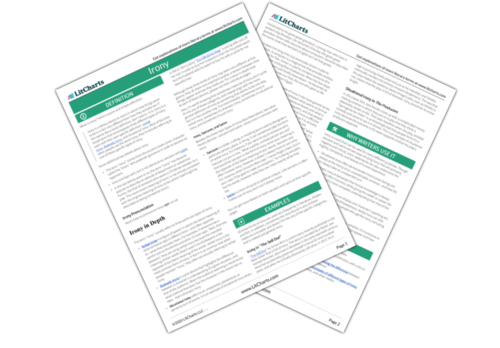
- PDFs for all 136 Lit Terms we cover
- Downloads of 1929 LitCharts Lit Guides
- Teacher Editions for every Lit Guide
- Explanations and citation info for 40,694 quotes across 1929 books
- Downloadable (PDF) line-by-line translations of every Shakespeare play
- Dramatic Irony
- Verbal Irony
- Deus Ex Machina
- Connotation
- Colloquialism
- Anadiplosis
- Parallelism
- Slant Rhyme
- Pathetic Fallacy
- Extended Metaphor
- Antanaclasis
- Internal Rhyme

Literary Devices
Literary devices, terms, and elements, definition of irony.
As a literary device, irony is a contrast or incongruity between expectations for a situation and what is reality. This can be a difference between the surface meaning of something that is said and the underlying meaning. It can also be a difference between what might be expected to happen and what actually occurs. The definition of irony can further be divided into three main types: verbal, dramatic, and situational. We describe these types in detail below.
The word “irony” comes from the Greek character Eiron, who was an underdog and used his wit to overcome a stronger character. The Greek word eironeía derived from this character and came to mean “dissimulation” or “purposely affected ignorance.” The word then entered Latin as ironia, and eventually became common as a figure of speech in English in the 16th century.
Irony is sometimes confused with events that are just unfortunate coincidences. For example, Alanis Morrissette’s song “Ironic” contains many events that are not ironic in any sense. She cites “rain on your wedding day” and “a traffic jam when you’re already late” as ironic situations, yet these are merely bad luck.
Types of Irony
Verbal irony.
Verbal irony takes place when the speaker says something in sharp contrast to his or her actual meaning. The speaker often makes a statement that seems very direct, yet indicates that the opposite is in fact true, or what the speaker really means. Looking at Alanis Morrissette’s “Ironic” again, the one true instance of irony comes when the man whose plane is going down says, “Well, isn’t this nice.” Clearly, the plane crash is anything but nice, and thus this utterance conveys the opposite of the man’s true feelings. Unlike dramatic and situational irony, verbal irony is always intentional on the part of the speaker.
Verbal irony can also consist of “ironic similes”, which are comparisons in which the two things are not alike at all. For example, “as soft as sandpaper” or “as warm as ice.” These similes mean that the thing in question is actually not soft or warm at all. The author Daniel Handler (who writes with the pen name Lemony Snicket) takes ironic similes to an extreme by qualifying them so they actually become real comparisons. For example: “Today was a very cold and bitter day, as cold and bitter as a cup of hot chocolate, if the cup of hot chocolate had vinegar added to it and were placed in a refrigerator for several hours.”
Dramatic Irony
Dramatic irony occurs when the audience has more information than one or more characters in a work of literature. This literary device originated in Greek tragedy and often leads to tragic outcomes. For example, in Shakespeare’s Othello, the audience is aware that Othello’s best friend Iago is villainous and attempting to bring Othello down. The audience is also aware that Desdemona has been faithful, though Othello doesn’t know this. The audience can foresee the imminent disaster.
There are three stages of dramatic irony: installation, exploitation, and resolution. In the case of Othello, the installation is when Iago persuades Othello to suspect that Desdemona is having an affair with a man named Cassio. Iago then exploits the situation by planting Desdemona’s handkerchief, a gift from Othello, in Cassio’s room. The resolution is only after Othello has murdered Desdemona when her friend Emilia reveals Iago’s scheme.
Situational Irony
Situational irony consists of a situation in which the outcome is very different from what was expected. There are contradictions and contrasts present in cases of situational irony. For example, in The Wonderful Wizard of Oz, the citizens of the Emerald City assume that Oz is great and all-powerful, yet the man behind the curtain is revealed to be an old man with no special powers.
Other types of irony:
- Cosmic Irony : Cosmic irony, also known as “irony of fate”, is present in stories that contain gods who have different agendas than humans. These gods, or the Fates, may play with the lives of humans for their own amusement. The irony lies in contrast between what the humans expect and what actually happens. Though this is most common in Greek legends, it is also present in Thomas Hardy’s Tess of the d’Urbervilles where the immortals play with Tess’s life.
- Historical Irony : Historical irony relates to real events that happened that, when seen in retrospect, had vastly different outcomes than predicted at the time. For example, Chinese alchemists discovered gunpowder when looking for a way to create immortality. The result of their discovery was the opposite of what they were looking for.
- Socratic Irony : The philosopher Socrates would pretend to be ignorant about the topic under debate to draw out the nonsensical arguments of his opponent. This is particularly evident in the Platonic dialogues. This technique is an example of dramatic irony because Socrates pretended to have less information than he really did.
Difference between Irony and Sarcasm
Though there are many similarities between verbal irony and sarcasm, they are not equivalent. However, there are many dissenting opinions about how, exactly, they are different. For example, the Encyclopedia Britannica simply explains that sarcasm is non-literary irony. Others have argued that while someone employing verbal irony says the opposite of what that person means, sarcasm is direct speech that is aggressive humor. For example, when Winston Churchill told Bessie Braddock that “I shall be sober in the morning, and you will still be ugly,” he was being sarcastic and not employing any irony.
Common Examples of Irony
- Verbal irony : “What a pleasant day” (when it is raining heavily)
- Situational irony : Referring to WWI as “the war to end all wars”
- Situational irony : In 1925 when the New York Times declared that the crossword puzzle was a craze that was “dying out fast”
- Dramatic irony : The movie “The Truman Show”, where only Truman doesn’t know that he’s being filmed at all times
Examples of Irony in Literature
Romeo and Juliet by Shakespeare
In this famous love story the audience can foresee the tragic ending long before Romeo and Juliet themselves know what’s going to happen. At the end of the play, Romeo finds Juliet and believes her to be dead though the audience knows she’s taken a sleeping potion. Romeo kills himself with this false knowledge. Juliet then wakes up and, finding Romeo truly dead, kills herself as well. This irony example is one of dramatic irony as the audience has more information than the characters.
MARK ANTONY: But Brutus says he was ambitious; / And Brutus is an honourable man.
( Julius Caesar by Shakespeare)
In this quote from Julius Caesar, Mark Antony is seemingly praising Brutus after the assassination of Julius Caesar. However, this example of irony is one of verbal irony, since Mark Antony is in fact implying that Brutus is neither ambitious nor honorable.
“The Gift of the Magi” by O. Henry
In this short story, a young, poor couple struggle with what to buy each other for Christmas. The woman cuts her hair and sells it to buy a watchband for her husband. Meanwhile, the husband sells his watch face to buy combs for his wife’s hair. This is an example of situational irony, since the outcome is the opposite of what both parties expect.
“The Little Mermaid” by Hans Christian Andersen
In this short story, and later in the Disney adaptation, a mermaid falls in love with a prince and saves him from drowning. Desperate to be with him, the mermaid makes a deal with a sea witch to trade her voice for human legs. Though the prince is charmed by the mermaid he doesn’t realize who she really is because she no longer has a voice. This is an example of dramatic irony where the audience has more information than the prince.
Test Your Knowledge of Irony
1. Choose the best irony definition: A. An unfortunate coincidence in which the worst possible ending comes to pass. B. A contrast between expectations for what is going to happen and what actually does happen. C. A biting comment meant to be both humorous and true. [spoiler title=”Answer to Question #1″] Answer: B is the best answer.[/spoiler]
2. Is the following an example of situational, dramatic, or verbal irony?
In Oedipus Rex, Oedipus kills his own father without realizing that the man is actually his father. This act brings on a plague and Oedipus swears that he will murder the man responsible, not knowing that he himself is responsible.
A. Dramatic irony B. Situational irony C. Verbal irony [spoiler title=”Answer to Question #2″] Answer: This is an example of dramatic irony, since the audience has more information than Oedipus does. A is thus the correct answer.[/spoiler]
3. American President John F. Kennedy’s final reported conversation was with a woman who announced, “Mr. President, you can’t say that Dallas doesn’t love you.” JFK agreed, “That’s very obvious.” Why is this an example of irony?
A. The event was very tragic, and thus it was ironic. B. JFK was aware that he was in danger, and thus employed verbal irony when he asserted that Dallas must love him, knowing this wasn’t the case. C. In retrospect, this conversation was ironic because the outcome of the situation was completely at odds with what anyone would have expected to happen. [spoiler title=”Answer to Question #3″] Answer: C is the correct answer.[/spoiler]

Definition of Irony
Irony is a literary device in which contradictory statements or situations reveal a reality that is different from what appears to be true. There are many forms of irony featured in literature. The effectiveness of irony as a literary device depends on the reader’s expectations and understanding of the disparity between what “should” happen and what “actually” happens in a literary work. This can be in the form of an unforeseen outcome of an event, a character ’s unanticipated behavior, or something incongruous that is said.
One of the most famous examples of irony in literature comes from The Gift of the Magi by O. Henry. In this story , a newly married couple decides independently to sacrifice and sell what means most to themselves in order to purchase a Christmas gift for the other. Unfortunately, the gifts they receive from each other are intended for the very prized possessions they both sold. As a result, though their sacrifices symbolize the love they have for each other, the actual gifts they receive are all but useless.
Common Examples of Irony
Many common phrases and situations reflect irony. Irony often stems from an unanticipated response ( verbal irony ) or an unexpected outcome ( situational irony ). Here are some common examples of verbal and situational irony:
- Verbal Irony
- Telling a quiet group, “don’t speak all at once”
- Coming home to a big mess and saying, “it’s great to be back”
- Telling a rude customer to “have a nice day”
- Walking into an empty theater and asking, “it’s too crowded”
- Stating during a thunderstorm, “beautiful weather we’re having”
- An authority figure stepping into the room saying, “don’t bother to stand or anything”
- A comedian telling an unresponsive audience , “you all are a great crowd”
- Describing someone who says foolish things as a “genius”
- Delivering bad news by saying, “the good news is”
- Entering a child’s messy room and saying “nice place you have here”
- Situational Irony
- A fire station that burns down
- Winner of a spelling bee failing a spelling test
- A t-shirt with a “Buy American” logo that is made in China
- Marriage counselor divorcing the third wife
- Sending a Christmas card to someone who is Jewish
- Leaving a car wash at the beginning of a downpour
- A dentist needing a root canal
- Going on a blind date with someone who is visually impaired
- A police station being burglarized
- Purchasing a roll of stamps a day before the price to send a letter increases
Examples of Irony in Plot
Irony is extremely useful as a plot device. Readers or viewers of a plot that includes irony often call this effect a “twist.” Here are some examples of irony in well-known plots:
- The Wizard of Oz (L. Frank Baum): the characters already have what they are asking for from the wizard
- Time Enough at Last (episode of “The Twilight Zone”): the main character, who yearns to be left alone to read, survives an apocalyptic explosion but breaks his reading glasses
- Oedipus Rex (Sophocles): Oedipus is searching for a murderer who, it turns out, is himself
- The Cask of Amontillado ( Edgar Allan Poe ): the character “Fortunato” meets with a very unfortunate fate
- Hansel and Gretel (Grimm fairy tale ): the witch, who intended to eat Hansel ad Gretel, is trapped by the children in her own oven
Real Life Examples of Irony
Think you haven’t heard of any examples of irony in real life? Here are some instances of irony that have taken place:
- It is reported that Lady Nancy Astor once said to Winston Churchill that if he were her husband, she would poison his tea. In response, Churchill allegedly said, “Madam, if I were your husband, I’d drink it.”
- Sweden’s Icehotel, built of snow and ice, contains fire alarms.
- Hippopotomonstrosesquippedaliophobia is the official name for fear of long words
- Fahrenheit 451 by Ray Bradbury is considered an anti-censorship novel , and it is one of the most consistently banned books in the United States.
- A retired CEO of the Crayola company suffered from colorblindness.
- Many people claimed and/or believed that the Titanic was an “unsinkable” ship.
- There is a hangover remedy entitled “hair of the dog that bit you” that involves consuming more alcohol.
- George H.W. Bush reportedly stated, “I have opinions of my own, strong opinions, but I don’t always agree with them.”
Difference Between Verbal Irony, Dramatic Irony, and Situational Irony
Though there are many forms of irony as a literary device, its three main forms are verbal, dramatic, and situational. Verbal irony sets forth a contrast between what is literally said and what is actually meant. In dramatic irony , the state of the action or what is happening as far as what the reader or viewer knows is the reverse of what the players or characters suppose it to be. Situational irony refers to circumstances that turn out to be the reverse of what is expected or considered appropriate.
Essentially, verbal and situational irony are each a violation of a reader’s expectations and conventional knowledge. When it comes to verbal irony, the reader may be expecting a character’s statement or response to be one thing though it turns out to be the opposite. For situational irony, the reader may anticipate an event’s outcome in one way though it turns out to happen in a completely different way.
Dramatic Irony is more of a vicarious violation of expectations or knowledge. In other words, the reader/audience is aware of pertinent information or circumstances of which the actual characters are not. Therefore, the reader is left in suspense or conflict until the situation or information is revealed to the characters involved. For example, a reader may be aware of a superhero’s true identity whereas other characters may not know that information. Dramatic irony allows a reader the advantage of knowing or understanding something that a particular character or group of characters does not.
Writing Irony
Overall, as a literary device, irony functions as a means of portraying a contrast or discrepancy between appearance and reality. This is effective for readers in that irony can create humor and suspense, as well as showcase character flaws or highlight central themes in a literary work.
It’s essential that writers bear in mind that their audience must have an understanding of the discrepancy between appearance and reality in their work. Otherwise, the sense of irony is lost and ineffective. Therefore, it’s best to be aware of the reader or viewer’s expectations of reality in order to create an entirely different and unexpected outcome.
Here are some ways that writers benefit from incorporating irony into their work:
Plot Device
Irony in various forms is a powerful plot device. Unexpected events or character behaviors can create suspense for readers, heighten the humor in a literary work, or leave a larger impression on an audience. As a plot device, irony allows readers to re-evaluate their knowledge, expectations, and understanding. Therefore, writers can call attention to themes in their work while simultaneously catching their readers off-guard.
Method of Reveal
As a literary device, irony does not only reveals unexpected events or plot twists . It serves to showcase disparity in the behavior of characters, making them far more complex and realistic. Irony can also reveal preconceptions on the part of an audience by challenging their assumptions and expectations. In this sense, it is an effective device for writers.
Difference Between Irony and Sarcasm
Although irony encapsulates several things including situations, expressions, and actions, sarcasm only involves the use of language that is in the shape of comments. Whereas irony could be non-insulting for people, sarcasm essentially means ridiculing somebody or even insulting somebody. Therefore, it is fair to state that although sarcasm could be a part of an element of irony, the irony is a broad term, encompassing several items or ingredients of other devices in it.
Use of Irony in Sentences
- A traffic cop gets suspended for not paying his parking tickets.
- “Father of Traffic Safety” William Eno invented the stop sign, crosswalk, traffic circle, one-way street, and taxi stand—but never learned how to drive.
- Alexander Graham Bell invented the telephone but refused to keep one in his study. He feared it would distract him from his work.
- Alan has been a marriage counselor for 10 years and he’s just filing for divorce.
- Oh, fantastic! Now I cannot attend the party I had been waiting for 3 months.
Examples of Irony in Literature
Irony is a very effective literary device as it adds to the significance of well-known literary works. Here are some examples of irony:
Example 1: The Necklace (Guy de Maupassant)
“You say that you bought a necklace of diamonds to replace mine?” “Yes. You never noticed it, then! They were very like.” And she smiled with a joy which was proud and naïve at once. Mme. Forestier, strongly moved, took her two hands. “Oh, my poor Mathilde! Why, my necklace was paste. It was worth at most five hundred francs!”
In his short story , de Maupassant utilizes situational irony to reveal an unexpected outcome for the main character Mathilde who borrowed what she believed to be a diamond necklace from her friend Mme. Forestier to wear to a ball. Due to vanity and carelessness, Mathilde loses the necklace. Rather than confess this loss to her friend, Mathilde and her husband replace the necklace with another and thereby incur a debt that takes them ten years of labor to repay.
In a chance meeting, Mathilde learns from her friend that the original necklace was fake. This outcome is ironic in the sense that Mathilde has become the opposite of the woman she wished to be and Mme. Forestier is in possession of a real diamond necklace rather than a false one. This ending may cause the reader to reflect on the story’s central themes, including pride, authenticity, and the price of vanity.
Example 2: Not Waving but Drowning (Stevie Smith)
Nobody heard him, the dead man, But still he lay moaning: I was much further out than you thought And not waving but drowning .

Example 3: A Modest Proposal (Jonathan Swift)
A child will make two dishes at an entertainment for friends; and when the family dines alone, the fore or hind quarter will make a reasonable dish, and seasoned with a little pepper or salt will be very good boiled on the fourth day, especially in winter .
Swift makes use of verbal irony in his essay in which he advocates eating children as a means of solving the issue of famine and poverty . Of course, Swift does not literally mean what he is saying. Instead, his verbal irony is used to showcase the dire situation faced by those who are impoverished and their limited resources or solutions. In addition, this irony is meant as a call to action among those who are not suffering from hunger and poverty to act in a charitable way towards those less fortunate.
Example 4: 1984 by George Orwell
War is Peace ; Freedom is Slavery and Ignorance is Strength .
There are several types of irony involved in the novel, 1984 , by George Orwell . The very first example is the slogan given at the beginning of the novel. This slogan is “ War is Peace ; Freedom is Slavery and Ignorance is Strength.” Almost every abstract idea is given beside or parallels to the idea that is contrary to it. These oxymoronic statements show the irony latent in them that although Oceania is at war, yet it is stressing the need for peace and the same is the case with others that although all are slaves of the state, they are calling it freedom. This is verbal irony.
Another example is that of situational irony. It is in the relationship of Winston and Julia that he secretly cherishes to have sexual advances toward her but outwardly hates her. When Julia finds that the place where it must be shunned, Junior Anti-Sex League, is the best place for such actions to do in hiding, it becomes a situational irony.
Synonyms of Irony
Some of the most known synonyms of irony are sarcasm, sardonicism, bitterness, cynicism, mockery, ridicule, derision, scorn, sneering, wryness, or backhandedness.
Related posts:
- Dramatic Irony
- 10 Examples of Irony in Shakespeare
- 15 Irony Examples in Disney Movies
- 11 Examples of Irony in Children’s Literature
- 12 Thought Provoking Examples of Irony in History
- Top 12 Examples of Irony in Poetry
- 10 Irony Examples in Shakespeare
- Romeo and Juliet Dramatic Irony
- Brevity is the Soul of Wit
- To Thine Own Self Be True
- Frailty, Thy Name is Woman
- My Kingdom for a Horse
- Lady Doth Protest too Much
- The Quality of Mercy is Not Strain’d
- Ignorance is Strength
Post navigation

- Features for Creative Writers
- Features for Work
- Features for Higher Education
- Features for Teachers
- Features for Non-Native Speakers
- Learn Blog Grammar Guide Community Events FAQ
- Grammar Guide
20 Irony Examples: In Literature and Real Life

Millie Dinsdale
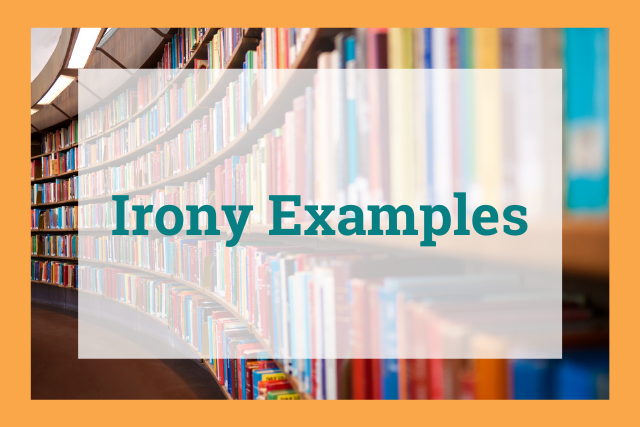
Irony occurs when what happens is the opposite from what is expected.
Writers use irony as a literary technique to add humor, create tension, include uncertainty, or form the central plot of a story.
We will be looking at the four types of irony (three common and one uncommon) and providing examples and tips to help you identify and use them in your work.
Quick Reminder of What Irony Is
Irony examples in literature, irony examples in real life, which scenario is an example of irony.
Irony is a rhetorical device in which the appearance of something is opposite to its reality .
There are four main types of irony: verbal irony, dramatic irony, situational irony, and Socratic irony . Socratic irony is not a literary device, and therefore we will not be looking at examples, but it is worth being aware of.
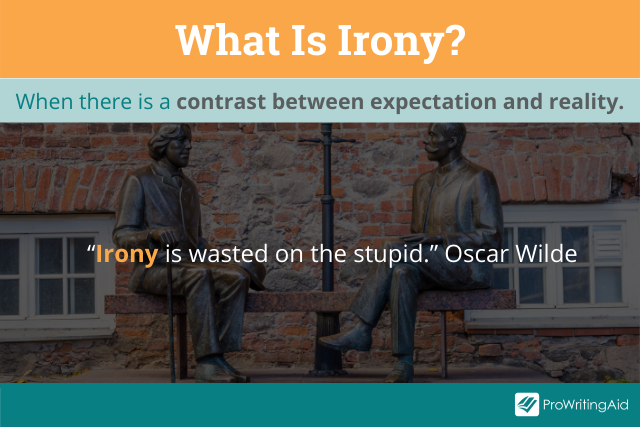
- Verbal Irony is when a speaker says one thing but means something entirely different. The literal meaning is at odds with the intended meaning.
- Dramatic Irony is when the audience knows something that the characters don’t.
- Situational Irony is when what happens is the opposite of what you expect.
- Socratic Irony is when a person feigns ignorance in order to get another to admit to knowing or doing something. It is named after Socrates, the Greek philosopher, who used this technique to tease information out of his students.
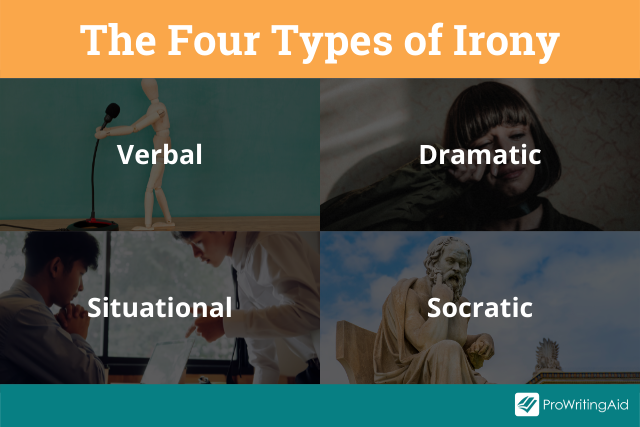
Why is irony important to understand? Along with being a key rhetorical device, irony can also be very effective when used correctly in writing.
To demonstrate this fact we have selected ten examples of irony usage from popular literature. Warning: this list includes a few spoilers.
1) The main characters’ wishes in L. Frank Baum’s The Wonderful Wizard of Oz are a perfect example of situational irony .
The characters go on a quest to fulfill their hearts’ desires and instead of doing so they realize that they already had what they wanted all along. It is unexpected because the reader might assume that all of their desires will be gifted to the four main characters but, in the end, it’s unnecessary.
2) The conclusion between the two primary opponents in The Night Circus contains a large amount of situational irony .
The reader is led to expect that either Marco or Celia will win but, in the end, they both end up working together to keep their creation alive. The competition is not as black and white (pardon the pun) as it initially seems.
3) The Strange Case of Dr Jekyll and Mr Hyde is full of verbal irony . A great example of this is when Dr Jekyll says “I am quite sure of him,” when referring to Mr Hyde.
This is verbal irony because the reader finds out that Hyde is actually Jekyll’s alter ego, so it would be expected that he knows himself well.
4) Shakespeare creates dramatic irony in the prologue of Romeo and Juliet through the line: “A pair of star-cross’d lovers take their life.”
This well-known example is ironic because the reader knows from the very beginning that their romance will end in death, but they don’t yet know how.
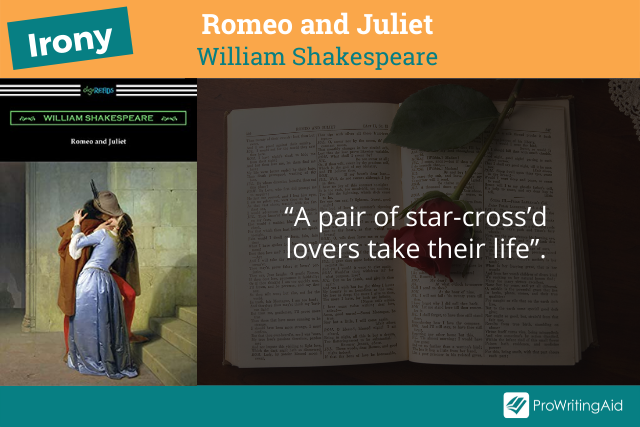
5) Alice’s changing relationship with the Bandersnatch in Alice in Wonderland is situationally ironic .
When we first meet the Bandersnatch, he is ferocious and attempts to harm Alice. When Alice returns his eye, they become friends and the two work together to defeat the Jabberwocky. The audience expects to see an enemy but are instead presented with an ally.
6) George Orwell masters situational irony in Animal Farm through the animals’ endless and fruitless battle to obtain freedom.
All of the animals work together to escape the tyranny of the humans who own them. In doing so they end up under the even stricter rule of the pigs.
7) Roald Dahl’s short story A Lamb to a Slaughter is full of dramatic irony .
A housewife kills her husband with a frozen leg of lamb when he asks for a divorce. The police come looking for evidence and unknowingly dispose of it when they are fed the murder weapon for dinner.
8) The repeated line “May the odds be ever in your favor” in Suzanne Collins’ The Hunger Games is verbally ironic .
Everyone from district 1 through 12 can be offered as a child sacrifice and has a 1/24 chance of surviving. Even if they do survive they are then delivered back under the control of the Capitol, so the odds are in nobody’s favor.
9) The disparity between children and adults in Roald Dahl’s Matilda is situationally ironic .
Most of the adults in Matilda’s life are hot-headed, uneducated, and unreasonable, while she as a six-year old is more mature than most of them. The traditional roles of child and adult are unexpectedly flipped on their heads.
10) The hit-and-run in F. Scott Fitzgerald’s The Great Gatsby is situationally ironic .
Daisy Buchanan kills Myrtle when Myrtle runs in front of Gatsby’s car. It is ironic because Myrtle is Tom Buchanan’s mistress but Daisy does not know this. She unintentionally killed her husband's mistress.
Irony works so well in literature because it is so common in real life. Have you ever found yourself saying “well that’s ironic” to a situation in your life?
You could be talking about verbal, situational, or dramatic irony. Let’s take a look at a few everyday examples of each type.
11) When you find out that your pulmonologist (lung doctor) smokes.
This is situationally ironic because you’d expect this doctor of all people to avoid smoking because they understand all of the risks.
12) When someone falls over for the tenth time while ice-skating and says “I meant to do that.”
This person cannot be intending to fall over all the time but they are using verbal irony to make light of a possibly painful situation.
13) Your dog eats his certificate of dog-training obedience.
You would expect that in the process of having obtained an obedience certificate, the dog would also have learnt not to eat random objects. This is an example of situational irony .
14) The fire hydrant is on fire.
This is situationally ironic because the last thing that you would expect to be on fire is the object that is designed to fight fires. A similar example to this would be if a fire station were on fire.
15) A girl is teasing her friend for having mud on his face but she doesn’t know that she also has mud on her face.
From the point of view of the friend, this is an example of dramatic irony because he knows something that she does not.
16) Your mom buys a non-stick pan but has to throw it away because the label is so sticky she cannot get it off.
You would predict that the pan was completely non-stick but are proven wrong at the first hurdle, which is situationally ironic .
17) When someone crashes into a “thank you for driving carefully'' sign.
The vision of a car crashed into the sign makes it clear that they did not drive carefully at all, which is situationally ironic .
18) Buying your English teacher a mug that reads “your the best teacher ever.”
The poor English teacher may feel like they have failed in their job in this situationally ironic situation where their student has bought them a mug with a grammar mistake.
19) When a child says “I want crisps now!” and the parent says: “Thank you so much for using your good manners.”
The child is being impolite and the parent is not actually congratulating the child on their manners in this example of verbal irony . They mean the exact opposite.
20) You can’t open your new scissors because you don’t have any scissors to cut through the plastic.
This example of situational irony is far too common. In buying scissors, it can be expected that you do not have any, so it is ironic that the packaging is designed for someone who already has a pair.
Are you ready for a quick quiz to test your knowledge of irony? The test is split into the three types of irony.
Which of These Are Examples of Situational Irony?
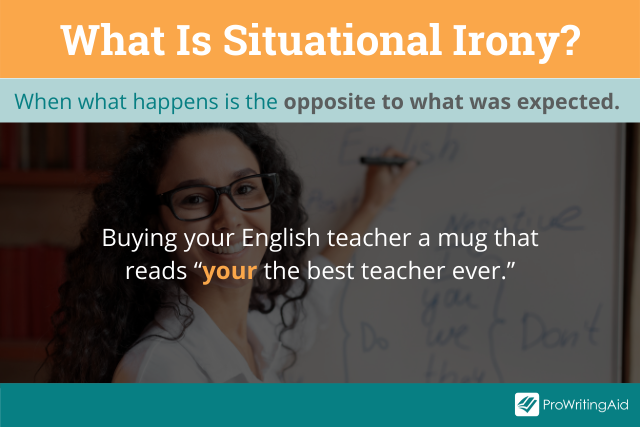
1) A police station is robbed.
2) A child loses his rucksack after being told to take care not to lose it.
3) A person eats sweets while preaching about healthy eating
Only 1) and 3) are examples of situational irony. Sentence 2) is not a situational irony example because it could be expected that the child might lose the rucksack and that is why they were told to take care.
It would, however, be ironic if he subsequently lost his “Most Organized in 2nd Grade” certificate five minutes after being awarded it.
Which of These Are Examples of Verbal Irony?
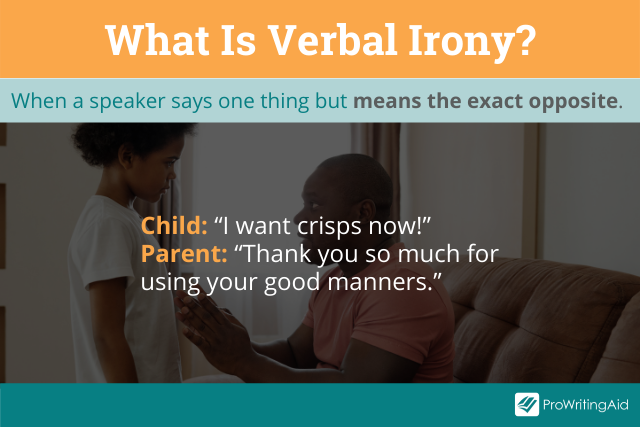
1) Saying “The weather is lovely today” while it is hailing.
2) “Wow that perfume is so lovely, did you bathe in it?”
3) Saying “Thank you so much for your help” after someone has crushed your new glasses while helping to look for them.
Only example 1) is verbally ironic, the other two are sarcastic comments.
Verbal irony and sarcasm are often confused but there is one big difference between them: verbal irony is when what you say is the opposite of what you mean while sarcasm is specifically meant to embarrass or insult someone.
Which of These Are Examples of Dramatic Irony?
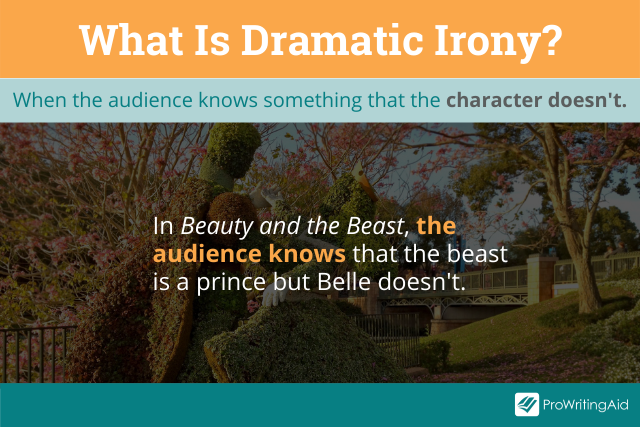
1) A small ship without life boats is stuck in a monumental storm in the middle of the Atlantic.
2) Three characters are killed and a fourth seems to be going the same way.
3) A girl walks down the same alley we have just seen a known murderer walk down.
Only option 3) is an example of dramatic irony because the audience knows that the murderer is down the alley but the girl does not.
Although the other two examples are undeniably dramatic, there is no inherent irony because the audience has no more knowledge about what will happen than those involved.
Why Should You Use Irony in Your Writing?
Irony can be an effective tool to make a reader stop and think about what has just happened.
It can also emphasize a central theme or idea by adding an unexpected twist to the events of the story.
What brilliant examples of irony in literature have we missed? Share your favorites in the comments.
Take your writing to the next level:

20 Editing Tips from Professional Writers
Whether you are writing a novel, essay, article, or email, good writing is an essential part of communicating your ideas., this guide contains the 20 most important writing tips and techniques from a wide range of professional writers..

Be confident about grammar
Check every email, essay, or story for grammar mistakes. Fix them before you press send.
Millie is ProWritingAid's Content Manager. Aa an English Literature graduate, she loves all things books and writing. When she isn't working, Millie enjoys adding to her vast indoor plant collection, dancing, re-reading books by Daphne Du Maurier, and running.
Get started with ProWritingAid
Drop us a line or let's stay in touch via :
- More from M-W
- To save this word, you'll need to log in. Log In
Definition of irony
called also dramatic irony
called also Socratic irony
Did you know?
What's irony ?
Considerable thought is given to what events constitute “true” irony, and the dictionary is often called upon to supply an answer. Here are the facts about how the word irony is used.
Irony has two formal uses that are not as common in general prose as its more casual uses. One refers to Socratic irony—a method of revealing an opponent’s ignorance by pretending to be ignorant yourself and asking probing questions. The other refers to dramatic irony or tragic irony—an incongruity between the situation in a drama and the words used by the characters that only the audience can see. Socratic irony is a tool used in debating; dramatic irony is what happens when the audience realizes that Romeo and Juliet’s plans will go awry.
The third, and debated, use of irony regards what’s called situational irony . Situational irony involves a striking reversal of what is expected or intended: a person sidesteps a pothole to avoid injury and in doing so steps into another pothole and injures themselves. Critics claim the words irony and ironic as they are used in cases lacking a striking reversal, such as “Isn’t it ironic that you called just as I was planning to call you?,” are more properly called coincidence .
The historical record shows that irony and ironic have been used imprecisely for almost 100 years at least, and often to refer to coincidence. This 1939 quote from F. Scott Fitzgerald is typical: "It is an ironic thought that the last picture job I took—against my better judgment—yielded me five thousand dollars five hundred and cost over four thousand in medical attention." Is this true situational irony? It’s debatable.
The word irony has come to be applied to events that are merely curious or coincidental, and while some feel this is an incorrect use of the word, it is merely a new one.
wit , humor , irony , sarcasm , satire , repartee mean a mode of expression intended to arouse amusement.
wit suggests the power to evoke laughter by remarks showing verbal felicity or ingenuity and swift perception especially of the incongruous.
humor implies an ability to perceive the ludicrous, the comical, and the absurd in human life and to express these usually without bitterness.
irony applies to a manner of expression in which the intended meaning is the opposite of what is seemingly expressed.
sarcasm applies to expression frequently in the form of irony that is intended to cut or wound.
satire applies to writing that exposes or ridicules conduct, doctrines, or institutions either by direct criticism or more often through irony, parody, or caricature.
repartee implies the power of answering quickly, pointedly, or wittily.
Examples of irony in a Sentence
These examples are programmatically compiled from various online sources to illustrate current usage of the word 'irony.' Any opinions expressed in the examples do not represent those of Merriam-Webster or its editors. Send us feedback about these examples.
Word History
Latin ironia , from Greek eirōnia , from eirōn dissembler
1502, in the meaning defined at sense 3
Phrases Containing irony
- dramatic irony
- Socratic irony
Articles Related to irony

Back to School Vocabulary
Word lookups that spike in September

Trending: Irony
After a widely read essay offered ways to "live without irony" ...
Dictionary Entries Near irony
iron yellow
Cite this Entry
“Irony.” Merriam-Webster.com Dictionary , Merriam-Webster, https://www.merriam-webster.com/dictionary/irony. Accessed 18 May. 2024.
Kids Definition
Kids definition of irony, more from merriam-webster on irony.
Thesaurus: All synonyms and antonyms for irony
Nglish: Translation of irony for Spanish Speakers
Britannica English: Translation of irony for Arabic Speakers
Britannica.com: Encyclopedia article about irony
Subscribe to America's largest dictionary and get thousands more definitions and advanced search—ad free!

Can you solve 4 words at once?
Word of the day.
See Definitions and Examples »
Get Word of the Day daily email!
Popular in Grammar & Usage
More commonly misspelled words, your vs. you're: how to use them correctly, every letter is silent, sometimes: a-z list of examples, more commonly mispronounced words, how to use em dashes (—), en dashes (–) , and hyphens (-), popular in wordplay, the words of the week - may 17, birds say the darndest things, a great big list of bread words, 10 scrabble words without any vowels, 12 more bird names that sound like insults (and sometimes are), games & quizzes.

- Daily Crossword
- Word Puzzle
- Word Finder
- Word of the Day
- Synonym of the Day
- Word of the Year
- Language stories
- All featured
- Gender and sexuality
- All pop culture
- Writing hub
- Grammar essentials
- Commonly confused
- All writing tips
- Pop culture
- Writing tips
Advertisement
[ ahy -r uh -nee , ahy -er- ]
the irony of her reply, “How nice!” when I said I had to work all weekend.
- a technique of indicating, as through character or plot development, an intention or attitude opposite to that which is actually or ostensibly stated.
- (especially in contemporary writing) a manner of organizing a work so as to give full expression to contradictory or complementary impulses, attitudes, etc., especially as a means of indicating detachment from a subject, theme, or emotion.
- Socratic irony .
- dramatic irony .
- an outcome of events contrary to what was, or might have been, expected.
- the incongruity of this.
- an objectively sardonic style of speech or writing.
- an objectively or humorously sardonic utterance, disposition, quality, etc.
[ ahy -er-nee ]
an irony color.
- of, resembling, or containing iron
/ ˈaɪrənɪ /
- the humorous or mildly sarcastic use of words to imply the opposite of what they normally mean
- an instance of this, used to draw attention to some incongruity or irrationality
- incongruity between what is expected to be and what actually is, or a situation or result showing such incongruity
- See dramatic irony
- philosophy See Socratic irony
- The use of words to mean something very different from what they appear on the surface to mean. Jonathan Swift uses irony in “ A Modest Proposal ” when he suggests the eating of babies as a solution to overpopulation and starvation in Ireland .
Discover More
Word history and origins.
Origin of irony 1
Origin of irony 2
Synonym Study
Example sentences.
That raised a particular irony, since Jones himself is arguably the Capitol’s biggest opponent of remote voting.
It’s no small irony the movement is based on fraudulent data, published by the now disgraced Andrew Wakefield, an English gastroenterologist.
The grand irony being that they all blame each other for, well, who’s to blame.
It’s a bitter irony that the e-waste mountains collecting in the world’s poorest places actually contain a fortune.
The dark irony is that, when people take to the streets to protest racism in policing, some police have used cutting-edge tools with a known racial bias against those assembled.
It may be fun and it may get them paid, until oversaturation ruins our sense for irony and destroys the market for it.
The irony did not escape one local, Laith Hathim, as he stood and watched the newly minted refugees make their way into Mosul.
The irony has thinned with the economy, perhaps: Who can really afford just to pretend to DIY today?
The root of the word irony is in the Greek eironeia, “liar.”
Lacking any sense of irony, Eldridge made campaign-finance reform a signature plank.
This unreasoning, feminine obstinacy so wrought upon him that he permitted himself a smile and a lapse into irony and banter.
Today her irony was concealed, but, like a carefully-covered fire, he knew it was burning still.
Barrington winced a little, for he recognized the irony in the failing voice, but he rose and moved towards the bed.
As you will see, I was unable to end my letter without a touch of impertinent irony, which proved how much in love I still was.
Ovid looked a bit doubtful, but Scattergood's voice was so interested, so bland, that any suspicion of irony was allayed.
Related Words

IMAGES
VIDEO
COMMENTS
Irony is a literary device or event in which how things seem to be is in fact very different from how they actually are. If this seems like a loose definition, don't worry—it is. Irony is a broad term that encompasses three different types of irony, each with their own specific definition: verbal irony , dramatic irony, and situational irony.
Definition of Irony. As a literary device, irony is a contrast or incongruity between expectations for a situation and what is reality. This can be a difference between the surface meaning of something that is said and the underlying meaning. It can also be a difference between what might be expected to happen and what actually occurs.
Definition of Irony. Irony is a literary device in which contradictory statements or situations reveal a reality that is different from what appears to be true. There are many forms of irony featured in literature. The effectiveness of irony as a literary device depends on the reader's expectations and understanding of the disparity between ...
Definition of Irony. It is ironic that several of America's Founding Fathers, who believed that all men were created equal, owned slaves. It is ironic that many people believe Columbus discovered America when Native Americans already inhabited North America. It is ironic that Julius Caesar's closest "friends" assassinated him.
10) The hit-and-run in F. Scott Fitzgerald's The Great Gatsby is situationally ironic. Daisy Buchanan kills Myrtle when Myrtle runs in front of Gatsby's car. It is ironic because Myrtle is Tom Buchanan's mistress but Daisy does not know this. She unintentionally killed her husband's mistress.
Following are some examples of verbal irony: "Today was a very cold and bitter day, as cold and bitter as a cup of hot chocolate." This is an excerpt from Lemony Snicket: The Unauthorized Autobiography by Daniel Handler. The statement compares a cold day with hot chocolate, which is expected to be hot; since the statement indicates the ...
Irony is a literary device that is used to convey a contrast between what is expected and what actually happens. There are several types of irony, each with its own unique characteristics. Here are a few examples of irony:. Verbal irony: This is when a speaker says one thing but means another.For example, a lifeguard saying "Great weather for swimming" when the water is too cold for anyone to ...
Answer: An example of irony is when you hope it doesn't rain, but it starts raining right after you say that. Explanation: Irony is something that signifies the opposite, usually pretty funny. Advertisement.
It should be noted that irony simply means saying the opposite of a particular thing. Irony is used in literature and it's a rhetorical device whereby something is different from what was expected. It's the expression of one's meaning by using a language that signifies the opposite. In conclusion, irony simply means opposite. Learn more about ...
irony: [noun] a pretense of ignorance and of willingness to learn from another assumed in order to make the other's false conceptions conspicuous by adroit questioning — called also#R##N# Socratic irony.
Irony definition: the use of words to convey a meaning that is the opposite of its literal meaning. See examples of IRONY used in a sentence.
Examples of Irony. The basic meaning of irony is the difference between how things seem to be and the reality. As a literary technique it is used when a certain outcome is revealed, but is not what readers were expecting or hoping for. Irony can be difficult to define; it's often subjective and depends on the audience's expectations.
A long list of irony examples. 1. A traffic jam forms on the road, dedicated to reducing city congestion, on its inauguration day. 2. A plumber's house floods because of a burst pipe he meant to fix. 3. The cat burglar's own home is burgled while he's out on a heist.
Find an answer to your question What is irony What are the 3 types of irony and examples of each?
Example: If it is pouring rain in the middle of a thunderstorm, someone might say, "Only a little drizzle." The difference between verbal, situational, and dramatic irony
The three types of irony are Verbal Irony, Situational Irony, and Dramatic Irony.. Example of Verbal Irony:. When a statement's intended meaning differs from what is actually said, it is said to be verbally ironic.; In Shrek, Donkey asks Shrek if he can stay with him. Shrek replies, "Of course," when he really means, "No, not really."
Answer:Irony, in its broadest sense, is a rhetorical device, literary technique, or event in which what appears, on the surface, to be the case, differs radically from what is actually the case. Irony can be categorized into different types, including: verbal irony, dramatic irony, and situational irony.Common Examples of Situational Irony.
Examples of Irony are a hearthplace station burning to the ground, a marriage mentor reporting for partition, the police headquarters getting burglarized, a submission via online entertainment whines roughly how vain web-based entertainment is, a webpage guests cop accepting his permit suspension ed because of neglected stopping tickets.. Irony might be marked into extraordinary sorts, like ...
Verbal Irony Examples - 877951. answered Verbal Irony Examples See answer Advertisement Advertisement mijanet mijanet Soft like a brick Hard as putty Clear like dirt As pleasant as surgery ... Get the Brainly App Download iOS App Download Android App Brainly.ph. PL: ...
From her heart grew tobacco, which people still use to give thanks in ceremony. She is called 'our mother' and the people dance and sing to her to make the plants grow.". Answer: C. A woman plays the lottery every day, only to find a buried treasure in her backyard. Explanation: